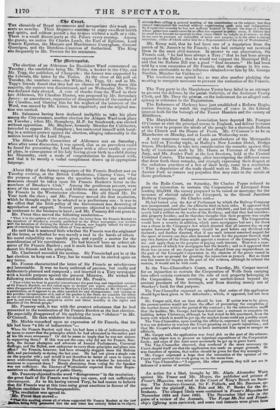In the Rolls Court, on Saturday, Sir Charles Pepys refused
to grant an injunction to restrain the Corporation of Liverpool from lending 105,0001. the money proposed to be raised on mortgage for the increase, of clerical salaries in Liverpool, to the Grand Junction Railway Company. Sir Charles said— He had looked over the Act of Parliament by which the Railway Company was incorporated, and also the affidavits filed on boils sides. It appeared that the Company purchased land to the amount of 100,000/., and had also expended nearly hallo million on the works of the Railway, and that they had consider- able property besides; and he therefore thought that their property was ample security for the amount proposed to be advanced to them. The Corporation would have a security in addition, which mere mortgagees had not ; for there was a clause in the Company's Act which directed that all interest due on any monies borrowed by the Company should be paid before any dividend was declared ; and further directed, that if any such interest remained unpaid for the space of twenty-one days after demand made for the payment thereof, that any two Justices of the Peace might appoint a receiver of the Company's tolls, &c. and apply them to the purpose of paying such interest. That was a sum- mary process of which few mortgagees had the benefit ; and as it appeared that there was no case of any danger to the fund alleged from any improvidence on the part of the Liverpool Corporation in the exercise of the power vested in them, he saw no ground for granting the injunction as prayed. But as there was fair reason for inquiry on the part of the relators, although he refused the motion, it would not be with costs.
In the Vice-Chancellor's Court, on Tuesday, Mr. Cooper moved for an injunction to restrain the Corporation of Wells from carrying into effect certain contracts for the sale of real property belonging to the Corporation, from erecting a new market-house beyond the ancient precincts of the borough, and from drawing money out of Stuckey's bank for that purpose.
The Vice-Chancellor expressed an opinion, that notice of this application should hive been given to the defendants ; which, it appeared, had not been done.
Mr. Cooper said, that no time should be lost. If notice was to be given, the present motion would not have the effect of preventing the completion of the market-house within the period of the contract ; for the information static that the builder, Mr. George, had been forced into a contract to complete the building before Christmas, although he had stated he felt convinced, from the hurry with which it would be got up, the market-house could not possibly stand. The Vice-Chancellor, upon reading the affidavit, expressed his opinion that it was too defective to warrant the Court granting an ex parte injunction ; and that Mr. Cooper's client ought not to have instructed him upon so meagre an affidavit.
Mr. Cooper said, the application was bond fide on the part of the relators. Their only object was to prevent an injurious expenditure of the Corporation funds ; and cases of this kind must necessarily be got up in great haste. The Vice-Chancellor observed, that rendered it the more necessary the Court should itself see that the application was made on proper grounds. He was therefore of opinion, that notice should be given for that day sennigbt. Mr. Cooper expressed a hope that the intimation of the opinion of the Court would prevent the work going on in the mean time.
The Vice-Chancellor—" I suppose, like other persons, they will not act io defiance of a notice of motion."


























 Previous page
Previous page